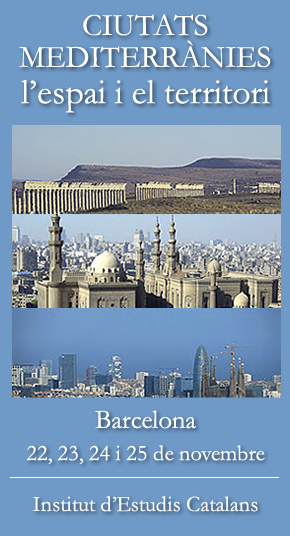This post is also available in: Catalan
The Institut d’Estudis Catalans (IEC) and the European Institute of the Mediterranean (IEMed), the local and regional institutions of Catalonia, in partnership with the La Caixa Banking Foundation and under the auspices of the Union Académique Internationale (UAI), have programmed the second international conference Mediterranean Cities: Space and Territory, the continuation of the first conference entitled Mediterranean Cities: Civilization and Development, also held in Barcelona from 16 to 18 November 2011.
The first conference brought together a large number of researchers, mainly historians, who provided an overall vision of the scientific objectives that should be pursued concerning the medieval city. The conclusions drawn led to the promotion of a project and the holding of several scientific meetings, such as on 28 September 2015 at the IEC, which identified new elements requiring a scientific discussion and the need to further explore five lines of analysis. These reveal the major importance of the space and the territory, which can determine the development of societies and become a mirror of social and political changes. This is why it is acknowledged that scientific analysis must begin with the study of the space of the urban interior and the territory around the cities that become their area of influence.
The conference comprises opening lectures addressing burning issues; six sessions of lectures providing a chronological picture of the construction of the urban and regional space in the Mediterranean from prehistory to the present; three roundtables to debate the pivotal issues of Mediterranean urban and regional identity; and two afternoon presentations concerning the current challenges facing Mediterranean cities. As a whole, it offers a necessary diachronic vision that helps focus and tackle the current issues in the space and territory of Mediterranean cities well into the 21st century.







